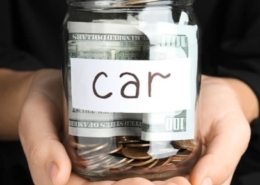Estimating Fuel Costs for Your New Car
Wondering how much your new car will cost you at the pump? Here’s everything you need to know to estimate fuel expenses and make smarter financial decisions!
Figuring Out Fuel Costs for Your New Car Purchase
Purchasing a new car is always a thrill. There’s something about the fresh smell of the interior, the feel of a sleek dashboard, and the luxury of heated seats that makes the whole experience exciting. But amid the excitement of test drives and shiny new features, there’s a less glamorous, though essential, factor to consider—fuel costs.
We’d all love to believe our new car could run on good vibes and a sprinkle of fairy dust, but unfortunately, reality sets in as soon as the gas tank starts running low. Fuel expenses can quickly add up, and while you may not feel it the moment you drive off the lot, your wallet will certainly speak up once those trips to the gas station become a regular occurrence.
Key Takeaways
- Estimate Fuel Efficiency: Understand your car’s MPG for city and highway driving to gauge how far you can go on a gallon of gas.
- Factor in Fuel Type: Determine whether your car requires regular, premium, or diesel fuel, as each comes with different costs.
- Assess Your Driving Habits: Consider how often and how far you drive to accurately project monthly and annual fuel expenses.
So, before the thrill of your new purchase is overshadowed by unexpected costs, let’s dive into how you can estimate fuel expenses for your new car.
By doing a little homework upfront, you can avoid any unwelcome surprises down the road and feel more confident about your decision. After all, financial peace of mind can be just as satisfying as that new car smell.
Car Buying Tip: New cars can be pricey in today’s market, but you can still find a deal by requesting new car price quotes online to compare local dealer prices.
Table of Contents
- Understanding fuel efficiency
- Why estimating fuel costs matter
- Calculating your fuel costs
- Factoring in your driving habits
- Tools to help estimate fuel costs
- How to reduce fuel costs
- What if gas prices spike
- Electric vehicles and fuel costs
- Hybrid cars: A middle ground
- Frequently asked questions
- Final thoughts
Understanding Fuel Efficiency
Fuel efficiency is one of the most essential aspects of calculating your car’s fuel costs. You know the drill if you’ve ever strolled through a dealership and seen stickers that brag about a car’s miles per gallon (MPG). Cars are rated by how many miles they can travel per gallon of gas in city and highway conditions. The higher the MPG, the less fuel you need, which is better for your wallet.
City vs. Highway MPG
City driving involves many stops and starts—think of the traffic lights and your brake pedal working overtime. This usually means worse fuel economy. On the other hand, highway driving is more consistent, so cars tend to use fuel more efficiently.
When looking at a car, it’s important to check both numbers and consider where you’ll spend most of your time driving. Are you crawling through city traffic or hitting the highway every morning?
Comparing Fuel Types: Gasoline, Diesel, Electric
Different cars run on various fuel types, each with its own costs. While gas-powered vehicles are the most common, electric cars and hybrids are rising. Diesel cars, meanwhile, tend to be more fuel-efficient than their gasoline counterparts but can cost more at the pump.
- Gasoline Cars: Gas is relatively cheap, but traditional gas engines are typically less fuel-efficient than hybrids or electric vehicles.
- Diesel Cars: Diesel often costs more per gallon but lasts longer in the tank due to better efficiency.
- Electric Vehicles (EVs): While you won’t have traditional fuel costs, you’ll need to consider the price of electricity and charging stations.
Why Estimating Fuel Costs Matters
The cost of fuel is one of the biggest expenses that come with owning a car. Sure, the dealership may entice you with a low monthly payment or a great financing deal, but if your car guzzles gas like it’s at an all-you-can-drink juice bar, those savings will quickly evaporate. Calculating fuel costs before you buy your vehicle is crucial for long-term financial planning.
Think of it as one more way to keep your life manageable and predictable, at least financially. Knowing what you’re getting into can save you from future stress, late-night arguments with your partner about who’s spending too much, and maybe even the occasional panic attack at the gas station when you realize prices have soared.
Calculating Your Fuel Costs
Once you’ve found a car you like, it’s time to break out the calculator (or phone). Estimating fuel costs can be simple if you follow a few basic steps. Let’s say the car you’re eyeing gets 25 MPG in the city and 35 on the highway. Here’s how you’d estimate fuel costs for each.
Step 1: Estimate Your Annual Mileage
How far do you drive each year? For most people, it’s about 12,000 to 15,000 miles. If unsure, look back at old maintenance records or your current vehicle’s odometer. Be realistic: bump that number up if you’ve got a long commute or love weekend road trips.
Step 2: Determine Your Typical Driving Conditions
Do you drive more in the city or on the highway? If you primarily drive in town, use the car’s city MPG rating; if you’re a road warrior, use the highway number. If you split your time between both, take an average.
Step 3: Check the Price of Fuel
Fuel prices vary across the country, even from one neighborhood to the next. At the time of writing, the national average is around $3.80 per gallon, but you should check local prices for the most accurate estimate.
Step 4: Do the Math
Now, let’s crunch the numbers. If you drive 15,000 miles yearly and your car gets 25 MPG, divide 15,000 by 25. You’ll need 600 gallons of gas per year. Multiply that by your local gas price (say $3.80), and you’re looking at about $2,280 a year on fuel.
This is a ballpark figure, of course, but it’s a great way to get an idea of what you’re in for before signing the papers.
- How to Buy a New Car Below Factory Invoice Price – True dealer cost and the factory invoice price are not the same… dealer cost can be much lower.
- Figure a Fair Profit New Car Offer – How to calculate a fair profit new car offer.
- How to Buy a New Car Online – Not sure where to start? Use my step-by-step guide on how to buy a new car online.
Factoring in Your Driving Habits
It’s not just about how far you drive but how you drive. Aggressive driving, like speeding and rapid braking, can decrease fuel efficiency by as much as 33% on the highway and 5% in the city.
Consider adopting a more relaxed driving style to keep your fuel costs low.
This is especially true if you’re stuck in stop-and-go traffic, where patience can pay off.
Commuting vs. Weekend Warriors
If your daily commute is relatively short, you might think fuel costs aren’t a big deal. However, short trips are more demanding on your car’s fuel efficiency because engines take time to reach their most efficient operating temperature.
On the other hand, long road trips or weekend adventures might mean more highway driving, where fuel efficiency tends to improve. Understanding how you use your car will give you a clearer picture of your fuel needs.
The Role of Vehicle Size and Weight
Size matters when it comes to fuel costs. Larger vehicles like SUVs and trucks are typically less fuel-efficient than smaller cars. This isn’t just because they have bigger engines—they’re also heavier, and it takes more energy to move all that weight.
- Compact Cars: These tend to have the best fuel economy because they’re light and have smaller engines.
- SUVs and Trucks: While these vehicles are great for hauling and off-roading, you’ll pay more at the pump.
It’s a trade-off: the bigger the vehicle, the more versatility it offers, but it also has higher fuel costs.
Real-Time Bargain Hunting: Turn to Edmunds for instant access to the latest and greatest local deals, saving you time, money, and stress.
Tools to Help You Estimate Fuel Costs
Lucky for us, we live in the internet age, where tools and calculators exist to make tasks like estimating fuel costs as easy as checking your social media.
1. Online Fuel Cost Calculator
An online calculator such as fueleconomy.gov lets you input your car’s make, model, year, and how much you drive. It then estimates your annual fuel cost based on current gas prices. Handy, right?
2. Mobile Apps
Apps like GasBuddy can also help you find the cheapest fuel stations nearby and offer historical fuel price trends. If you’re more old-school, you can keep a mileage log and calculate things manually, but why would you? Life’s too short.
Reducing Fuel Costs: What You Can Do
The good news is that while fuel costs are somewhat predictable, you can reduce them by changing your driving habits or opting for a more fuel-efficient vehicle.
1. Choose a Fuel-Efficient Car
Hybrid and electric vehicles (EVs) are becoming increasingly popular because they cut down significantly on fuel expenses. And with governments offering tax incentives for going green, it’s worth considering. Even if you’re not ready to go full-electric, plenty of fuel-efficient cars on the market can save you money in the long run.
2. Drive Smarter, Not Harder
Aggressive driving, frequent acceleration, and heavy braking are all enemies of fuel efficiency. You might feel like you’re in a high-speed chase every time you get on the highway, but trust me, it’s better for your wallet and sanity if you take it easy.
3. Regular Maintenance
Keeping your car in good shape and completing preventive maintenance improves fuel efficiency. Properly inflated tires, clean air filters, and regular oil changes may sound boring, but maximizing your MPG makes a huge difference.
Long-Term Planning: What If Gas Prices Spike?
You might be one of those people who live in denial, thinking gas prices will stay the same forever. I hate to be the bearer of bad news, but gas prices fluctuate.
When estimating fuel costs, it’s a good idea to factor in potential price hikes. This way, you’ll be somewhat prepared when gas prices inevitably go up.
Electric Vehicles and Fuel Costs
If you’re considering an electric vehicle (EV), your fuel costs will slightly differ. Instead of gallons of gas, you’ll use kilowatt-hours (kWh) of electricity. Charging at home is usually cheaper than filling up at the pump, but there are a few things to consider:
- Electricity Prices: Like gas, electricity prices can vary depending on where you live. Some utilities even offer discounted rates for charging EVs overnight.
- Charging Stations: If you rely on public charging stations, you must factor in those costs. Some are free, but others can be as expensive as gas, depending on the location and the provider.
Despite these costs, EVs tend to be cheaper to “fuel” overall than traditional gas-powered cars, especially if you can afford home charging.
Hybrid Cars: A Middle Ground
Hybrid cars give you the best of both worlds. They use a combination of gas and electric power to deliver excellent fuel efficiency, especially in the city. A hybrid might be a great option if you’re not ready to go fully electric but still want to save on fuel costs. They tend to cost a bit more upfront but often pay off in fuel savings over time.
FAQs
How do I calculate fuel costs for a hybrid car?
To calculate fuel costs for a hybrid, consider both the electric and gasoline components. Look up the car’s combined MPG and estimate how often you’ll use gas versus electric power.
Do electric cars have fuel costs?
Electric cars don’t use gasoline, but their charging costs are generally lower than those of filling up a gas tank. Charging costs depend on local electricity rates and whether you charge at home or public stations.
Is it worth paying more for a fuel-efficient car?
In most cases, yes. A fuel-efficient car will save you money on gas over time, especially if you drive long distances regularly. It might cost more upfront, but the savings can offset that.
How does my driving style affect fuel costs?
Aggressive driving, like speeding and rapid braking, can significantly reduce fuel efficiency and increase fuel costs. Driving smoothly and maintaining a steady speed will help you get the most out of each gallon.
What’s the best car for saving on fuel?
Smaller, lighter cars tend to be the most fuel-efficient. If you want something larger, consider a hybrid or electric vehicle to save on fuel costs.
Do city drivers pay more for fuel than highway drivers?
Typically, yes. City driving with frequent stops and starts tends to use more fuel than highway driving, where speeds are steadier and more fuel-efficient.
Conclusion: Estimating Fuel Costs for Your New Car
Estimating fuel costs for your new car might seem daunting initially, but it’s one of the most crucial steps in making an informed decision. Fuel expenses don’t just affect your monthly budget—they can significantly impact the entire time you own the vehicle.
Many buyers focus on the sticker price or financing options but overlook the ongoing cost of filling the tank. Estimating these costs can help avoid unpleasant surprises down the road.
One of the primary factors to consider when estimating fuel costs is fuel efficiency. A car’s miles per gallon (MPG) rating will give you a good idea of how much gas you’ll use. Generally, the higher the MPG, the less you’ll spend on fuel.
However, it’s also important to think about your driving habits. Do you primarily drive in the city, where fuel efficiency tends to be lower due to stop-and-go traffic, or are you frequently on the highway, where cars perform more efficiently? Understanding your driving conditions helps you more accurately predict your future fuel expenses.
Lastly, consider the type of vehicle you’re looking to buy. Larger vehicles like SUVs and trucks usually consume more fuel, which means higher costs over time. On the other hand, smaller cars, hybrids, or electric vehicles offer better fuel efficiency and could save you money in the long run.
By factoring in these critical elements—fuel efficiency, driving habits, and vehicle type—you can make a smarter choice, ensuring that your new car fits your lifestyle and aligns with your financial goals.















